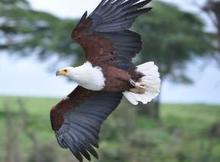
Biodiversity change is ultimately an aggregate of manifold changes playing out at the level of single individuals and their interactions with others and the environment. How the individual use of space, resources, and environments then combine to collectively form ecological patterns at the level of communities is one of the most intriguing questions at the interface of a behavior and ecology, and of fundamental relevance for global change science. After animal movement studies have begun to uncover these links for many individuals of single species, new scalable GPS tracking technologies and fine-scale airborne and satellite remote sensing now enable a previously impossible multi-species perspective.
In this symposium, we will discuss the integrative research opportunities that an intensive single-site, simultaneous multi-species study system using these new technologies would provide. We plan to test hypotheses around individual/species co-occurrence and interactions in a spatiotemporally scalable fashion and explore the potential for experiments benefiting from tracking technology to link behavioral and ecological processes. We will take wildlife-rich tropical regions as particular focus and assess how mechanistic insights connecting individual and community level processes can may inform the sustainable management of these landscape and their livelihoods under future climate and land-use change.
REGISTRATION REQUIRED. Please register here.
Speakers:
9:00 am Tracking Biodiversity Movement:
Walter Jetz (Yale, MPYC): Welcome
Martin Wikelski (MPIO, MPYC): The Internet of Animals: a global collective of intelligent sensors for Planet Earth
9:45 am Multi-Species Movement Ecology:
Meg Crofoot (UC Davis):
Roland Kays (NC State): Comparative tracking of four frugivores
Katherine Mertes (Smithsonian): Animal movements reveal the spatial scale of the ecological niche
11:00 am Integrating Multi-Individual Behavior:
Dan Rubenstein (Princeton U): Wild Equid Movements: The Importance of Habitat Quality, Predation Pressure and Leadership
Blair Costelloe (MPIO): Quantitative field studies of collective behavior: an approach using drones and computer vision
Damien Farine (MPIO): High-resolution GPS tracking of individual movement, collective movement, and population-level social structure
1:15 pm From Individual Movement to Species Ecology:
Dustin Rubenstein (Columbia U): How environmental variation in time and space affects group structure and dynamics in social species
Raul Costa-Pereira (McMaster): Individual niche variation in interacting species
Brett Jesmer (Yale, MPYC): Causes and consequences of individual niche variation
Remington Moll (Michigan State): Challenges and opportunities in modeling mammal communities across space and time
3:45 pm Movement Informed by Remote Sensing:
Doris Klein Doris Klein (Earth Observation Center): Remote Sensing for landscape characterization
Ryan Pavlick Ryan Pavlick (NASA): Integrating animal tracking with the next generation of ecosystem remote sensing
3:45 pm Movement Ecology, Conservation, and Global Change:
Matthew Mutinda (Kenya Wildlife Service): Motivation to move in savanna ecosystems: communities and wildlife past and present
Jared Stabach (Smithsonian): Wildebeest as Sentinels of Habitat Change and Connectivity
Vanessa Ezenwa (U Georgia): Linking individual behavior to community responses: is there a role for parasites?
Tyler Kartzinel (Brown): Connecting earth observations with ecological networks



